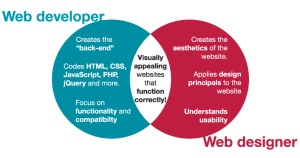Technology is a great field that continually evolves, presenting the opportunity for innovation, constant learning, and competition. Within the technology landscape, there are hundreds of career options, just one of which is a Web developer. If you are one of those business owners that are looking for reliable web developers, this site https://www.webcitz.com/ecommerce-development.html can help you hire the right one.
Web developer is a general term used for someone who develops and actually creates websites or other components of Internet material, such as landing pages or individual webpages, mobile applications, gizmos, widgets, and more. Essentially, if it’s something that you can view via an Internet connection, a Web developer was involved.
According to Indexsy there are two types of Web developers: front end and back end developers. Back end developers work behind the scenes, writing code in various languages and working in databases. In contrast, front end developers work with creating the front end of a website or application — or, in other words, the parts that you see.

Back End Developer Job Description
Back end developers, as the title implies, work with the back end of an Internet site or application — the parts that you can’t see.
Think back to our house — you’ll never really see the studs or plumbing systems; they’re hidden behind the facades and visual elements. But without them, the house wouldn’t really exist. While visitors interact with the front end of a website, that website wouldn’t really do anything if it weren’t for that functional back end.
For example, if your house only had the finishing components (drywall, paint, etc.), it would be rather one-dimensional. You could see the front, but there wouldn’t be various rooms (aka pages), nor would lights turn on or toilets flush. In the Web world, you would have, at most, a pretty landing page that offered no functionality; your forms wouldn’t submit to anywhere, you couldn’t navigate to other pages within the website, etc. — because the back end developer completes all of these components.
Back end developers are sometimes called programmers — they program sites and applications to do things. They often know a variety of programming languages, such as .asp or .php, among others. Remember how we mentioned that technology is continually evolving? Well, so are programming languages — there are constantly new languages evolving that offer new, enhanced functionality, while other languages (*cough* Cold Fusion *cough*) fall by the wayside. Back end developers make it their job to learn and master these new languages so that they can offer top-of-the-line websites to clients.
Additionally, they frequently work with building or utilizing databases to draw queries to build functionality within the websites. For example, if a Web page will have a landing page aimed at collecting information from a visitor, there needs to be a place for that information to send to, log, and be recalled when needed; the back end developer will build this functionality.
Back End Web Developer Education and Salary
Back end developers often study programming, computer science, or other related fields at a university. Many development jobs require a four-year degree, though a technical degree may be acceptable for certain opportunities.
As with anything, salary will depend on experience, education, and location. That said, according to the 2012-2013 Robert Half Technology Salary Guide, the annual salary range for an entry-level developer fell between $61,250 and $99,250. Comparatively, the same guide notes a salary between $85,750 and $118,500 for a senior Web developer. Those ranges are expected to grow approximately 7 percent within a year.
Front End Web Developer Job Description

Think about it this way — if you walked into a house with open walls and no finished fixtures, it would look rather confusing; would you know how to turn on a light without a light switch? Or get to the second floor without stairs (or a ladder)? The front end developers do this; they build the pieces that the user knowingly interacts with.
As is the case for back end developers, front end developers also have a series of programming languages that they work with, such as Java and CSS. And, as is the case with back end programming languages, front end languages also become obsolete (think Flash) over time as new developments and technologies are created.
It is important to note that front end developers and front end designers are two very different things. Developers work with building and bringing to life a pre-established design, while designers work with programs, such as Illustrator and Photoshop, to sketch nonfunctioning renderings of how a site or application will visually appear to the end user.
Front End Web Developer Salary and Education
Front end developers are in demand and employed at nearly every agency or corporation that builds websites or applications. That said, there is a growing need that allows for some flexibility; however, many employers still require a four-year degree in a related field. Additionally, they will desire developers fluent in HTML, CSS, JavaScript, AJAX, and possibly even .php, .asp, and other programming languages. There is a high degree of variance, however, based on the exact needs of the position and organization.
In terms of salary, according to a 2012 American Institute of Graphic Arts salary survey, the median reported salary for a front end Web developer was $60,000, while the top 25 percent of earners made $80,000 or more each year and the bottom 25 percent earned $48,500 annually. Again, exact salary will depend on location, education, existing knowledge of various languages and programming skills, and professional experience.
The Similarities: Front End vs Back End Web Development
Web developers of all types, be it front end, back end, or a specialty, all have a few things in common. Firstly, they need to have an appreciation for and understanding of technology. Since there is a specific focus on computers — and approximately 100 percent of your time will be spent working with or thinking about them in some capacity — you need to be comfortable with them and comfortable working both in a team and solo.
Much of a Web developer’s time is spent coding, which is typically a solo activity; however, when trying to develop a solution to a complex problem, it is critical to function within a group. Additionally, certain environments will require the developers to function as part of an overall creative team and, in some cases, even participate in client presentations and strategy sessions. There is great variety in the work, and your exact requirements for solo and teamwork balance will vary from position to position and company to company.
The Differences
There are some key differences between front end and back end Web developers. For starters, front end developers tend to work more closely with other members of the team — particularly with the designers. Front end and back end developers will also generally work closely together to ensure function and aesthetic meet and blend as intended.
Additionally, there are differences in training and technologies. Front end developers will typically work within more common languages, such as HTML JavaScript, and CSS. However, back end developers typically have a need for more intense knowledge of various programming languages. Additionally, back end developers will work more with databases and complementary systems, such as Apache, MySQL, and others — front end developers rarely (if ever) touch these technologies.
In terms of other technologies, back end developers may be pulled into server maintenance or system design. Because of this, they may work in a Windows environment or a Linux environment, depending on the server configurations. Front end developers generally work within the Windows system — particularly since they need to be able to view the final front end designs as the end user will.
Beyond the work functionalities and technologies, there are also some differences in pay. Generally speaking, salaries are higher for back end developers. While there is not an industrywide reason for this, it typically ties back to the amount of training and technology knowledge required. While programming languages are learnable, it takes some significant training and experience to tie together some of the core competencies back end developers typically work with, such as database design and complicated queries.
All in all, there is plenty of variety in the Web developer world, and every career opportunity within that world is a bit different. To get started, consider perusing current job openings to get a better understanding of what a position might entail, as well as its requirements; from there, you can map your next steps and plan for any training you might need.
- CCNA vs CCNP-Which Certification is Best for You? - March 30, 2021
- The Network Administrator Job Description and Salary Guide - July 21, 2020
- Health Information Management Job Description and Salary Expectations - December 14, 2019





No Comments